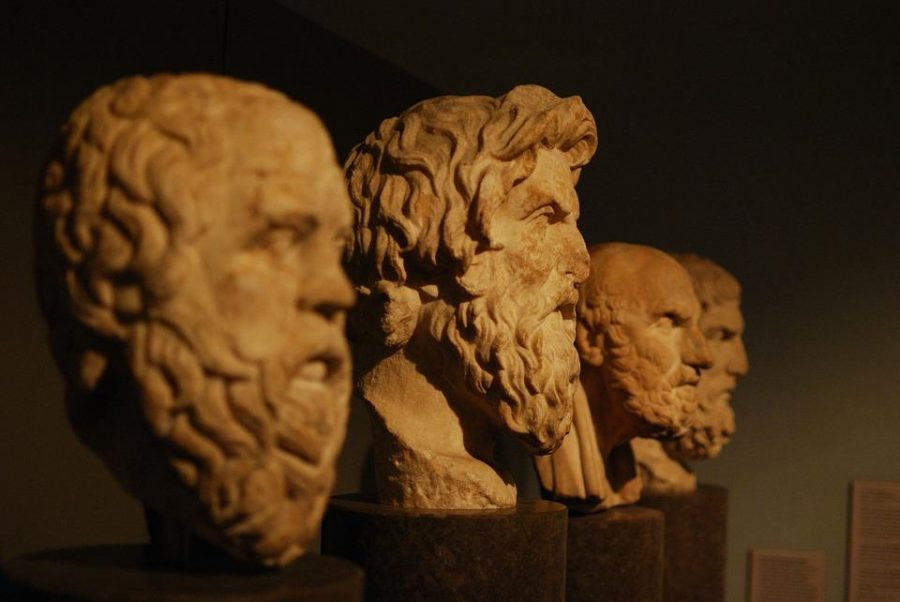A lot is expected of us as university students. We were sent here to secure a profession, master a craft and make connections that will last a lifetime, but most importantly a key task of a college student is to discover who they are. What makes somebody who they are? To those who ever wonder what makes people believe and act the way they do, or to those who lay awake at night pondering how they feel about certain topics and ideas, there is an ancient study and art that will help qualm those curiosities: philosophy.
We live in an incredibly polarizing time in American and world history, and it can often be confusing to those who just simply cannot understand the logic behind some people’s beliefs and lifestyles. But philosophy is there for the right-wing citizen who can’t fathom the thought processes of socialists and communists. It’s there for the left-leaning voter who cannot tolerate conservatives and nationalists. It’s there for the individual who simply doesn’t know where he or she stands. Ideals of the liberal and left-wing school of thought stem back to Aristotle, Tao and Locke while right-wing and more conservative thoughts come from Plato, Confucius and Burke. If it is difficult to empathize with the current and modern forms of these ideas, it could be beneficial and enlightening to view them as they were originally perceived. When we can understand and sympathize with our political opponents, solutions and compromises seem a bit more plausible.
There are big concepts and ideas in the world that we simply do not understand. Everybody has some subject that they do not have any knowledge on and can only claim ignorance to when brought up in conversation. For me, one of the big ones is economics. Growing up, I never really read or studied economics, and I sometimes find myself at a disadvantage as a result. To bridge that gap, I began to study the ideas and logic of minds like Adam Smith and Bernard Mandeville, and I then began to formulate my own thoughts — because one shouldn’t study philosophy to regurgitate and imitate the reasoning of another person, but rather to create their own unique ideas.
The other great advantage of being well-versed in the abstract is what it can do for social interactions. The conversations that I enjoy and recall the most fondly are the ones about my own and other peoples’ views on life and all that it contains. Looking to impress somebody and give them the impression that you’re a thinker? Host a discussion on life’s great questions. Spare you and your company the mundane and lackluster small talk and have an experience you and your friends won’t forget and will think about long after it’s over. There really is no down side to increasing your philosophic arsenal and all it costs is time.
Now that you’ve decided you would like to dive into the vast world of abstract thinking, allow me to introduce you to my most important principle when selecting whom or what I study. Do not fear judgement for what you decide to read about. I come from a conservative household and host a circle of fairly liberal friends. My parents would probably be disgusted by the fact that I have works by Karl Marx and Saul Alinsky in my bookshelf, and my friends would be equally shocked to find books by Nicollò Machiavelli and Ayn Rand. You can’t broaden your horizons if you keep yourself in the bubble of what you think is acceptable, so be willing to learn from the radical and controversial.
Don’t quite know where to start? You can always begin with the essentials. You may know their names from history class, but you probably don’t know about the ideas that made them famous. Gautama Buddha, Socrates, Friedrich Nietzsche, Immanuel Kant and others are considered key figures in ancient and modern philosophies and have inspired the minds of many of the other greats. If that doesn’t interest you, another simple way to get started is to simply search some of the major schools of thoughts. Pick two or three of the ones that interest you the most and then search for some of the most important books in those schools. This should help if you would like to expand your intellectual horizons but you find reading Marcus Aurelius a tad bit drab.
It’s critical to remind yourself that philosophy doesn’t have to be an intimidating area to dive into. And philosophy also isn’t just about some guy who died hundreds of years ago spouting off about life lessons you heard thousands of times from your parents and teachers. In philosophy, there are new thinkers who change the way people view the world every day, and it’s okay to disagree with them sometimes. My favorite philosopher is Slavoj Žižek. Sixty-eight years old and still kicking, he educates listeners every day. He’s a great example of how accessible philosophy can be in the modern era. While he does have books — he also has lectures, speeches and short videos uploaded to YouTube every day for people to consume. He’s a Marxist, which directly conflicts with my philosophy that capitalism is the only real viable economic system in a civil society in the modern world. But he still has a wonderful trail of logic and reasoning that he has mapped to his conclusions on socialism and communism that allows me to respect him even though I don’t agree with him.
And finally it’s important to remember that one does not have to read colossal books to learn a little about philosophy. It’s integrated in all of our art and entertainment and simply analyzing the movies we watch and the music we listen to can open your mind to concepts and theories great minds have been mulling over for centuries. One can witness Nietzschean ideas in action in movies like “Blade Runner,” hear criticisms of capitalism in Pink Floyd’s “Animals” and experience the concepts of Ayn Rand in video games like “BioShock.” It doesn’t matter how you expose yourself to these thoughts, it’s just important that you do. As humans we have created a strange and confusing world — will you take the time to understand it?
letters@chronicle.utah.edu



